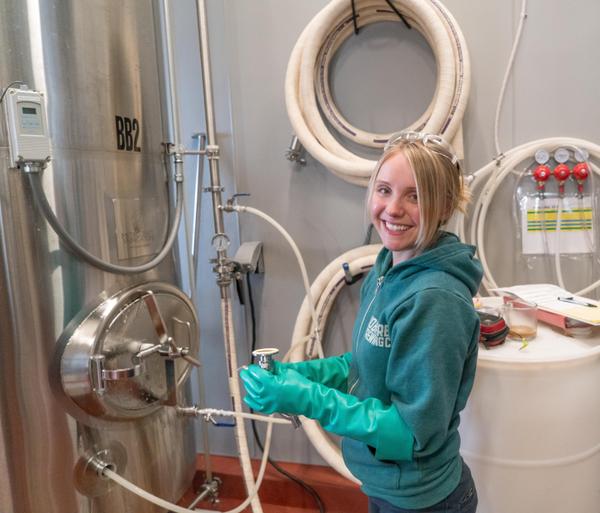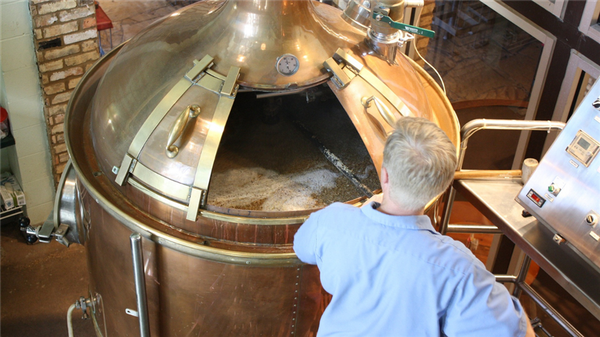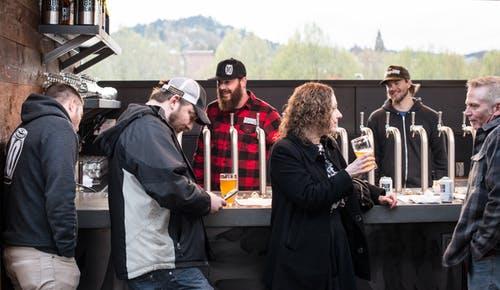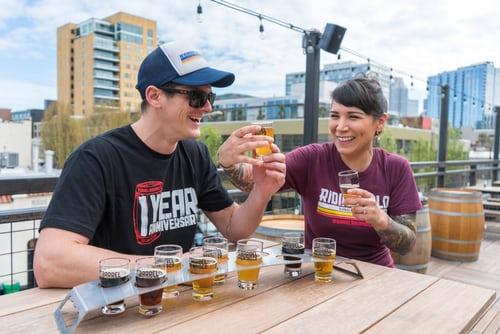Introduction
The craft beverage industry has grown rapidly in Wake County, North Carolina. Craft beverages are those manufactured on a small scale, produced by independent businesses, and based on the creative use of traditional ingredients (American Craft Spirits Association 2019; Brewers Association 2019). In addition to jobs and tax contributions, this industry also creates many benefits for residents and other industries, including improved quality of life (Strom and Kerstein 2015), increased property values (Nilsson and Reid 2019), and contributions to workforce development (Stolarick et al. 2010).
The craft beverage industry in Wake County is also generating benefits through tourism. More visitors than ever are traveling to craft beverage themed events, tours, and trails. These tourism activities translate into direct spending, tax receipts, and overnight visits in Wake County. To capitalize on these benefits, Wake County must sustain the growth of its craft beverage industry and expand the tourism experiences it currently offers.
A variety of community resources require investment if the craft beverage industry is to generate direct and tourism-induced benefits. To gain an understanding of those resources (inputs) and the resulting benefits (outputs), we interviewed 30 stakeholders in Wake County’s craft beverage industry in 2018 (Figure 1, Figure 2, Figure 3, and Figure 4). We first conducted an online search of Wake County’s craft beverage stakeholders; we invited 68 stakeholders to participate in an interview. We conducted 24 in-depth interviews with 30 participants in the fall of 2018 (Table 1). Two research team members identified themes in the data related to the inputs and outputs. The entire research team participated in a debriefing session to compare codes and associated data and summarize the results.
|
|
Community |
|||||||||
|
Type |
Apex |
Cary |
Fuquay-Varina |
Holly Springs |
Knightdale |
Morrisville |
Raleigh |
Countywide |
Statewide |
Total |
|
Association |
1 |
|
1 |
|
|
1 |
1 |
|
3 |
7 |
|
Educator |
|
|
|
|
|
|
1 |
|
|
1 |
|
Event organizer |
|
|
|
1 |
|
|
1 |
|
|
2 |
|
Information curator |
|
|
|
|
|
|
|
|
2 |
2 |
|
Producer |
|
1 |
1 |
|
3 |
|
5 |
|
|
10 |
|
Retail |
|
|
|
|
|
1 |
2 |
|
1 |
4 |
|
Tourist services |
|
|
2 |
|
|
|
|
2 |
|
4 |
|
Total |
1 |
1 |
4 |
1 |
3 |
2 |
10 |
2 |
6 |
30 |
Craft Beverage Stakeholders
Different stakeholders representing multiple groups are involved in the craft beverage industry. These stakeholders include producers (such as breweries and distilleries), associations (such as chambers of commerce, tourism promotion offices, and industry-specific associations), tourist service providers (such as tour operators), event organizers (such as festival managers), retail businesses (such as bars and bottle shops), information curators (such as individuals who manage directories), and educators (such as brewing program instructors). These stakeholders may operate in the private or public sector at the community, county, or state level.
Community Resources
We identified the resources that have helped establish and grow Wake County’s craft beverage industry (inputs) and the positive outcomes that are generated by the industry (outputs). Flora et al. put those inputs and outputs into seven categories.
- Financial: Assets available to invest in community development efforts.
- Built: All human-constructed infrastructure.
- Political: Access to decision-makers to have a voice in public issues.
- Human: People’s skills and abilities that shape the future of the community.
- Social: Connections among people and organizations in a community that foster cohesion.
- Cultural: Mix of local beliefs, values, history, heritage, and the dynamics of a community.
- Natural: All the natural attributes of a community including environment, amenities, and landscapes.
Stakeholders indicated that the development of the craft beverage industry in Wake County was based in seven types of community resources (inputs):
|
Resource |
Stakeholder’s Quote |
Interpretation |
|
Financial |
“Banks are hesitant to make that kind of investment. Access to funding is very, very challenging.” (Association Representative) |
Finding financial support is a major challenge for craft beverage stakeholders because this industry is considered nontraditional and risky. |
|
Built |
“We found properties in parts of town that just no one was there. It was a ghost town ... We moved in to areas where there weren't anybody. We built the businesses. People just started flocking there.” (Producer) |
Real estate access is vital to establishing a craft beverage industry, as producers become “hot spots” that attract other businesses, new customers, and new residents. |
|
Political |
“We rely on the association to advocate for the producers, for the industry in Raleigh. That's really what the association does.”(Association) |
Industry associations help stakeholders gain access to political decision-makers in support of the craft beverage industry. |
|
Human |
“I would say thinking outside the box ... being willing to sweat and work, but also brewing is a very artistic field ... being willing to try new things.” (Educator) |
The craft beverage industry requires individuals with specific skills and abilities, some of which do not come from formal education. |
|
Social |
“There is a huge support with local and state governments for small business and entrepreneurship that has created a thriving business for small business entrepreneurs.” (Information Provider) |
Social connections within and outside of the craft beverage industry help entrepreneurs get started. These relationships can come from the public or private sector. |
|
Cultural |
“Because Cary has such a large population of families. It's a great space for dogs and kids.” (Producer) |
Many Wake County residents see craft beverage operations as spaces for everyone to enjoy because of the diversity of the county’s residents. |
|
Natural |
“We're an agricultural state, and we want to represent that in some way, so that became our craft cocktail list ... We were inspired by the local grower movement that was going on in the restaurant scene.” (Retailer) |
Craft beverage stakeholders benefit from North Carolina’s agricultural diversity and try to take advantage of current trends focused on local products. |
Stakeholders indicated that the development of the craft beverage industry in Wake County created six types of community resources (outputs):
|
Resource |
Stakeholder’s Quote |
Interpretation |
|
Financial |
“We let the business dictate where we are … it keeps growing so we keep adding a new tank … a canning line … bigger and better coolers, delivery vehicles.” (Producer) |
Once established, craft beverage operations often increase their investments either for expansion or improvement of their current facilities. |
|
Built |
“[The town is] revitalizing one of the parks nearby us. They’re putting in a town heritage museum across the street from us. They’re doing some investment in the area.” (Producer) |
Craft beverage stakeholders promote urban revitalization and growth, which benefits local residents and attracts more visitors to the area. |
|
Political |
“With some of the law changes starting in 2015 that allowed distilleries to sell bottles and in 2017 allowed us to sell even more bottles, it made a greater incentive for us to build more of a tourism spot.” (Producer) |
Changes in alcohol-related regulations have incentivized expansion of craft beverage operations. |
|
Human |
“A lot of times [visitors] ask, ‘Are there any craft breweries where we can just go and just relax?’… That lets people know that is a growing place with exciting things to do. It does come down to quality of life.” (Association Representative) |
The growth in number of craft beverage operations has improved the quality of life in the county. This helps stakeholders attract future residents and workforce members. |
|
Social |
“People do auctions and stuff, and they’re asking us all the time for donations to silent auctions and stuff like that. We give as much as we can. We definitely want to be involved in the community.” (Producer) |
Craft beverage stakeholders acknowledge the importance of being part of the community and strive to build connections that allow them to give back. |
|
Cultural |
“I think they serve the most important purpose of being a public house and a gathering place and a third place … a place for socializing and exchanging ideas is important, so I think they’re a community enhancement in a way.” (Association) |
Craft beverage operations provide a space to bring together community members. This plays a vital role in facilitating an inclusive culture. |
Benefits of the Craft Beverage Industry
This report identifies the input resources that contributed to the establishment of the craft beverage industry in Wake County as well as the output resources that this industry provided to the county. Undoubtedly, the craft beverage industry produces many outputs that benefit residents and other industries including:
- Revitalization of areas in need of greater development through the creation of clusters of amenities (such as tasting rooms, bars, and restaurants) for residents and tourists to enjoy.
- Increased capital investment and creation of jobs in the craft beverage industry.
- Establishment of space to promote an inclusive culture that generates local pride and contributes to a unique image for tourism.
- Strengthened connections among entrepreneurs, residents, and visitors that create a sense of community.
- Increased quality of life for residents, which helps attract new residents and workforce to the community.
- Changes in policy that support expansion of craft beverage operations and other industries.
Advancing Craft Beverage Tourism Development
The expansion of craft beverage tourism in Wake County could increase the benefits that the craft beverage industry is delivering by generating greater demand for Wake County’s local products. Furthermore, this growth could generate new benefits, such as increased tourist spending and tax receipts, as well as more overnight visits. Tax revenues in particular can have a significant impact because they are generated by local businesses and by tourists during their stay, which can reduce tax burden for residents.
To capitalize on the growing demand for craft beverage tourism, it is recommended that stakeholders work together to continue strengthening Wake County’s craft beverage industry by:
- Ensuring access to real estate (particularly in close proximity to other producers) and adequate shelf space in retail outlets.
- Maintaining an inventory of funding sources to support craft beverage businesses and related associations.
- Embracing and contributing to the values and spaces that support local culture.
- Establishing and strengthening networks inside and outside of their community to facilitate mentorship and partnerships.
- Developing the diverse skills and knowledge needed in the craft beverage industry through formal and informal opportunities involving all stakeholders, from producers to front line employees.
- Prioritizing the use of local ingredients in craft beverages because it adds value and emphasizes authenticity.
- Encouraging leadership roles to advocate in favor of the craft beverage industry to educate stakeholders on the impacts of existing and proposed policy.
- Calling for the development of economic impact studies specific to craft beverages, which will provide data to support changes in policy, investments, grants, and loans.
While each community will have its own unique blend of resources that are currently available and those that need further development, these recommendations can help establish a healthy craft beverage tourism industry that will generate many benefits for community residents and other industries.
References
American Craft Spirits Association. 2019. “About: Craft.” Accessed Sept. 18, 2019.
Brewers Association. 2019. “Craft Brewer Definition.” Accessed Sept. 18, 2019.
Flora, C. B., J. L. Flora, and S. P. Gasteyer. "Community Capitals and the Rural Landscape." In Rural Communities: Legacy + Change, 5-32. New York: Routledge, 2016. https://doi.org/10.4324/9780429494697-2.
Nilsson, I., and N. Reid. "The value of a craft brewery: On the relationship between craft breweries and property values." Growth and Change 50, no. 2 (June 2019): 689–704. https://doi.org/10.1111/grow.12292.
Stolarick, K., M. Denstedt, B. Donald, and G. M. Spencer. "Creativity, tourism and economic development in a rural context: The case of Prince Edward County." Journal of Rural and Community Development 5, no. 1 (2010): 238–254.
Strom, E., and R. Kerstein. "Mountains and muses: Tourism development in Asheville, North Carolina." Annals of Tourism Research 52 (May 2015): 134–147. https://doi.org/10.1016/j.annals.2015.03.006.
Acknowledgments
We greatly appreciate the time and insight shared by our interview participants. We would also like to thank our reviewers for this publication, including Dr. KangJae “Jerry” Lee (Department of Parks, Recreation, and Tourism Management; North Carolina State University), Marlise Taylor (Visit North Carolina; Economic Development Partnership of North Carolina), and Colleen McNamara (Trophy Brewing Company). This project was supported by the NC State Office of Outreach and Engagement’s Fiscal Year 2018 Outreach and Engagement Incentive Grants Program.
Publication date: Oct. 16, 2019
AG-866
N.C. Cooperative Extension prohibits discrimination and harassment regardless of age, color, disability, family and marital status, gender identity, national origin, political beliefs, race, religion, sex (including pregnancy), sexual orientation and veteran status.




